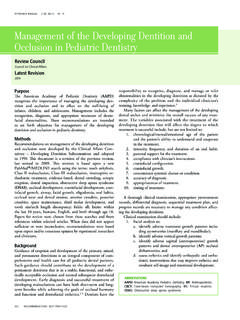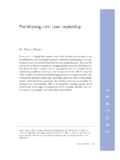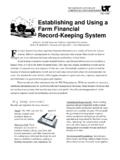Transcription of Traditional Knowledge in Socio-Economic Develop- ment ...
1 International Review of Social Sciences and Humanities Vol. 5, No. 2 (2013), pp. 245-256 ISSN 2248-9010 (Online), ISSN 2250-0715 (Print) Traditional Knowledge in Socio-Economic Develop- ment :National and Local Perspectives Svetlana Panikarova Chair of Management Katanov State University of Khakasia Abakan, Russia, 620067, Russia Ekaterinburg, Uralskayastreet 52/1, 136 E-mail: (Received: 3-4-13 / Accepted: 13-5-13) Abstract The purpose of this paper is to discuss the perspectives of use of Traditional Knowledge in na-tional Socio-Economic development in general and in the development of local communities of aboriginal nations of Siberiain particular.
2 This study aims to analyze the Traditional eco-nomic activity with the help of the questionnaire of 1500 respondents (from different ethnic groups) in different parts of the Siberian region - Khakasia. The results of empirical research have shown that in Khakas communities Traditional kinds of activity are extended and they are of great importance for people as earlier. Comparative analysis of labor productivity in animal husbandry and wildlife management allows to draw a conclusion of positive influence of Traditional Knowledge on these fields of activity.
3 Some clusters of Traditional economic in-stitutions of the indigenous people of Southern Siberia have been identified. The results of evolution of Traditional institutions and their current state are presented. Even the transformed institutions are accepted by members of national communities as earlier. The spiraling process of Traditional Knowledge of Khakas people is explained in the SECI Model. Three strategies to manage the Traditional Knowledge were recommended. The research demonstrates the tra-ditional Knowledge may be the factor of economic increase and social development for local society.
4 Moreover, it is a national heritage and it needs to be managed. Keywords: Socio-Economic development, community, Traditional Knowledge . 1. Introduction Traditional Knowledge refers to Knowledge , capability, experience and wisdom that have been accumulated, existed, survived or developed in accordance to the ecological system, natural surroundings, society and cultures. According to UNESCO the meaning for Traditional Knowledge is similar to intangible cultural heritage: the practices, representations, expres-sions, Knowledge , skills that communities, groups and, in some cases, individuals recognize as a part of their cultural heritage (UNESCO, 2003).
5 Knowledge is a process involving the social construction of ideas about the external world that guide human action. Traditional Knowledge systems, locally rooted in a particular geography, are mostly culturally transmitted via collective memory that is encoded in stories, myths, legends, songs, dances, rituals, and practices. Traditional Knowledge can be common Knowledge , such as Knowledge about land-Svetlana Panikarova 246 use or resource-use, practices, and may be shared by the members of all the social groups within a community (Xu et al.)
6 , 2005). The interest to intangible cultural heritage and Traditional Knowledge as factors in Socio-Economic development has increased for last decades all over the world. Unfortunately the capabilities of Traditional Knowledge as resource in national and local sustainable Develop- ment in Russia are not realized to the full. The purpose of research is to discuss perspectives of use of Traditional Knowledge in national Socio-Economic development in general and in the development of local communities of ab-original nations of Siberiain particular.
7 Following ways of using of Traditional Knowledge potential for Russian economy and society: a) Economic benefits and impact of Traditional Knowledge : - Tool for development of tourism and connected branches; - Way of increase of Agricultural production and wildlife management; - Resource for development of alternative medicine; - Tool for regional development; - Creating jobs for Aboriginal people and migrants; - Energy saving; - Catalyst of technical innovation. b) Societal benefits and impact of Traditional Knowledge : - Serving as catalyst of intercultural dialogue; - Promoting sustainability; - Forging local and regional identity; - Contributing to social cohesion; - Enhancing quality of life for Aboriginal people and migrants.
8 The research describes economic and social situation of one of Siberian ethnic group the Khakas people. Khakas is an aboriginal ethnos of Southern Siberia which Traditional em-ployment are nomadic cattle breeding, hunting and gathering of forest product. The structure of the paper is as follows: The second section presents the problem definition and introduces Khakas community background. The third section presents the research framework about Traditional kinds of activity of Khakas people.
9 The forth section presents the results of the evolution-institutional fifth section presents the discussion about management of Knowledge in Khakas communities and the last section is the conclusion. Definition In 1991 the territory populated by Khakas peopleand it got the status of a republic. The title ethnos (Khakas) makes 12% of population of Khakasia or 65,4 thousand persons. The con-temporary ethnic composition of Khakasia has been formed rather recently. The results of the First Russian Population census in 1926 showed Khakas had made 53% (44,2 thousand per-sons) of all inhabitants of the territory.
10 Population had sharply increased (3,1 times) from 1926 to 1939. It continued to improve further because of inflow of labor migrants from other parts of Russia. This influx of the Russian-speaking migrants has provoked the acceleration of assimilation of the autochthonic government policy on industrialization of Siberia has destroyed habitual life of the aboriginal people and hasn't offered any other alter-nativesof employment. Physical and mental health of Khakas have been dramatically decreas-International Review of Social Sciences and Humanities, Vol.











![Abstract arXiv:1707.01836v1 [cs.CV] 6 Jul 2017](/cache/preview/4/1/7/c/3/c/f/5/thumb-417c3cf524207c81cbb20aac762ce5b4.jpg)